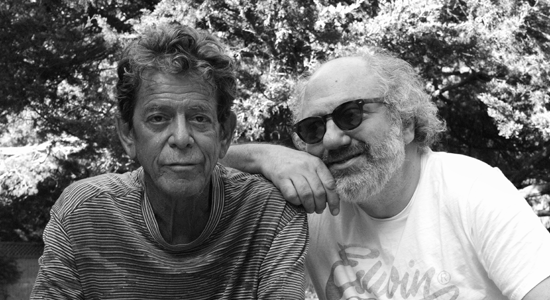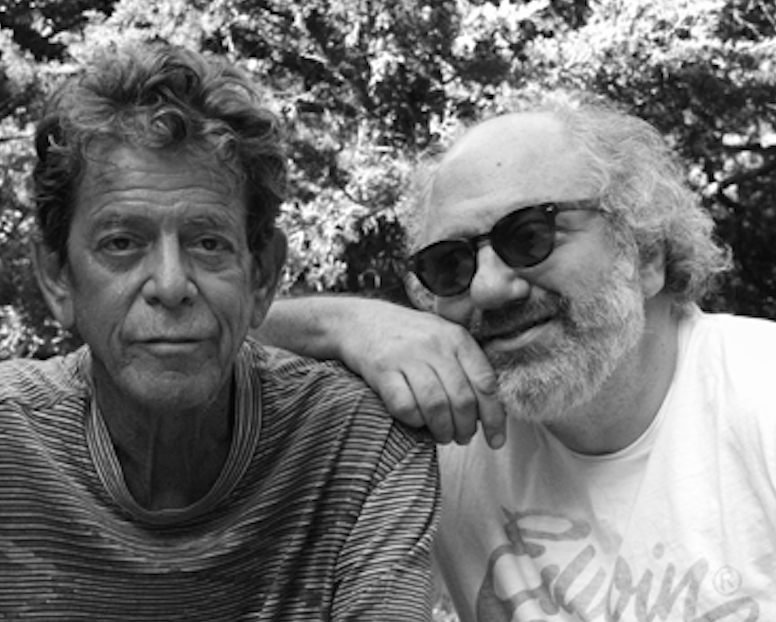
Hal Willner’s Lou Reed (or Lou Reed’s Hal Willner)
Mention to Hal Willner that he’s a sort of keeper of the flame, and he grumbles. The producer has, since 1981, been an all-around music boss at Saturday Night Live as its sketch-music adaptor, coordinator and composer. Around this same time, he began to create and curate smart tribute albums to the esteemed likes of Nino Rota, Charles Mingus, Thelonious Monk, Kurt Weill and other genre-busting geniuses who forged a blueprint for the art form. Willner also created sonic sound beds for Beat Generation literary godfathers William S. Burroughs, Allen Ginsberg and their beatnik comic cousin Lenny Bruce.
“No, they don’t need me to do anything with their flames,” says Willner. “I am happily associated with Bruce and the Beats and am always available to that crowd,” pointing to the 2016 Burroughs-released work Let Me Hang You.
When it comes to the late, great Lou Reed, however, Willner is happy to carry a torch.
Reed’s last producer—“in a humbling list of illustrious names: Bob Ezrin, Tom Wilson, David Bowie, Mick Ronson, Richard Robinson, to say nothing of the guy who painted the banana,” he laughs, considering Velvet Underground associate Andy Warhol—is proud of tackling 2000’s Ecstasy, 2003’s The Raven and all original work and Reed compilations until his death in 2013. Their newest (but not last) collaborative production is the recently released The RCA & Arista Album Collection, which captures Reed fresh from leaving the Velvets up through depressive art rock (Berlin, Street Hassle), glam (Transformer), showy, silly soul (Sally Can’t Dance), swishy folk (Coney Island Baby), noise (Metal Machine Music) and more.
“It is a mammoth catalog that you think you know until you dig into it,” says Willner, mentioning how he and Laurie Anderson, Reed’s widow, separated out Reed love songs for the early summer 2016 all-Reed spectacular outside of Lincoln Center, where a “misty rain never felt so mesmerizing.” To quote Donald Trump, says Willner, “This is huge.”
Willner first worked with the daring ex-Velvet on 1985’s Lost In The Stars: The Music Of Kurt Weill, with the guitarist/singer morphing the German theater composer’s most plaintive ballad, “September Song,” into an era-appropriate Reed rocker. “I had the first Velvets album, Berlin and Transformer but didn’t cling to everything Reed did,” says Willner. “Rock got stale for me by 1975, so I moved to NYC to become a jazz producer because of the innovative work of Sun Ra and such. By the ’80s, however, jazz got stale, and I drifted back to rock.” And Reed.
“Lou wasn’t told to have a producer like most artists are by the label, he chose to,” says Willner. “He wanted another voice—a buddy, a partner—and that other voice happened to be mine. I’m also not just a record producer but rather an all-around collaborator, a one-stop shop. But with him, you came ready to work. He taught me to focus, really focus. You did your job. Bear with him. Listen hard, then harder. Follow his lead and call the shots when they needed to be called.”
The same was even truer when it came to The RCA & Arista Album Collection. According to Willner, Reed knew he was “obviously” dying, as did those close to him (“We all lived in denial,” says Willner) and wanted this re-breathing of his ’70s and ’80s catalog to be brilliant, a true last will and testament to his powers as a poet guitarist and sonic elocutionist. “It was amazing watching and listening to him pointing to what needed to be enhanced and what to be left alone,” says Willner.
According to Willner, the new boxed set is not “remixed” but rather reconsidered for Blu-ray sound. With that, Reed could realize that which had long been stuck in his head, like the dynamic effect of binaural sound that was Street Hassle (“his headphone album”) or to bring out the nuanced background vocals of that same album’s “I Wanna Be Black” and the Bowie/Ronson harmonies of Transformer. “Lou really marveled at their vocal lines and wanted their dimensions to sound greater,” says Willner. “He relived everyone’s contributions to his work.”
With that, Willner sees The RCA & Arista Album Collection as a gift to rock, jazz, poetry, punk, noise and pop—like Miles Davis, an ever-shifting palette of sounds that had peaks and valleys, but always made the music his own and changed the culture.
“To go from the Velvets to Metal Machine Music—all before 1975 and often with great criticism—is something to behold,” says Willner. “Lou Reed changed the game and often.”
—A.D. Amorosi







